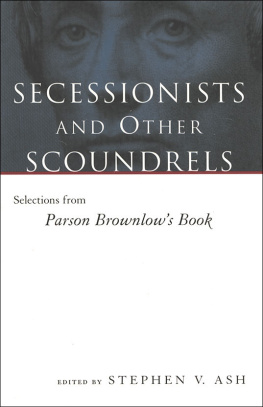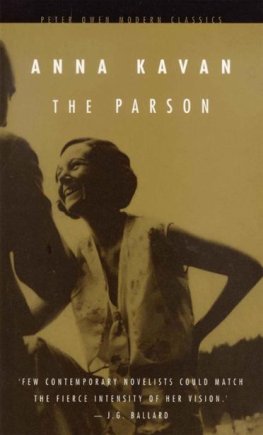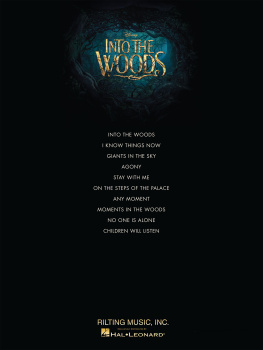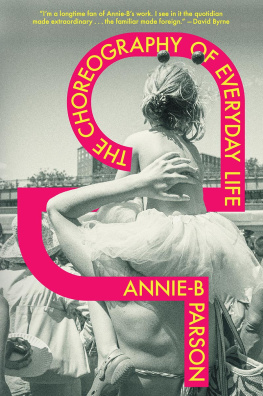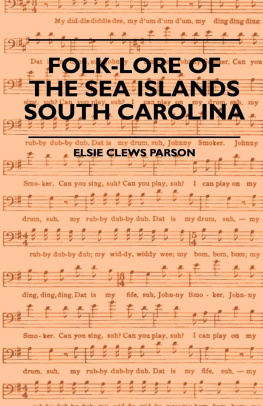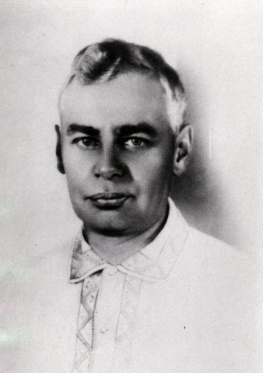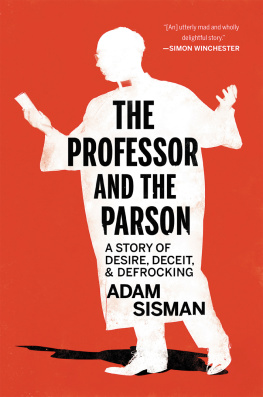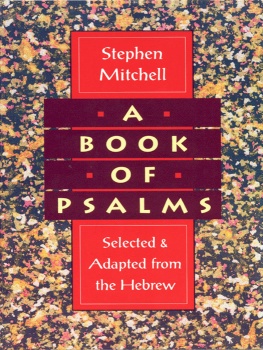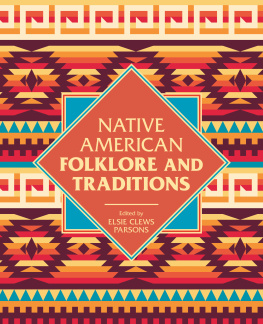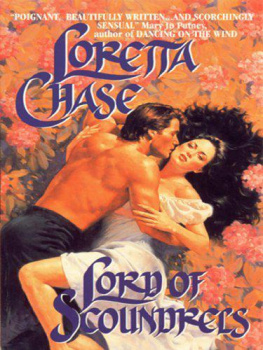Copyright 1999 by Stephen V. Ash
All rights reserved
Manufactured in the United States of America
First printing
00 02 04 06 08 07 05 03 01 99
1 3 5 4 2
Designer: Barbara Neely Bourgoyne
Typeface: Trajan; Granjon
Typesetter: Coghill Composition
Printer and binder: Edwards Brothers, Incorporated
Library of Congress Cataloging-in-Publication Data
Brownlow, William Gannaway, 18051877.
[Sketches of the rise, progress, and decline of secession. Selections]
Secessionists and other scoundrels : selections from Parson Brownlows book / edited, with an introduction, by Stephen V. Ash.
p. cm.
Selections from William Gannaway Brownlows Sketches of the rise, progress, and decline of secession. 1862.
Includes bibliographical references and index.
ISBN 0-8071-2353-6 (cloth : alk. paper). ISBN 0-8071-2354-4 (pbk. : alk. paper)
1. SecessionSouthern States. 2. United StatesPolitics and government18611865. 3. TennesseePolitics and government1861-1865. 4. Tennessee, EastHistoryCivil War, 1861-1865. 5. Brownlow, William Gannaway, 18051877. 6. RefugeesSouthern States. I. Ash, Stephen V. II. Title.
E458.2.B90 1999
973.7'13dc21
98-50888
CIP
William Gannaway Brownlows Sketches of the Rise, Progress, and Decline of Secession; with a Narrative of Personal Adventures Among the Rebels was published in Philadelphia, 1862, by George W. Childs. Illustrations in this edition are taken from the original.
The paper in this book meets the guidelines for permanence and durability of the Committee on Production Guidelines for Book Longevity of the Council on Library Resources.

EDITORS INTRODUCTION

In the spring of 1862, as the Civil War entered its second year, an East Tennessee newspaper editor sat down in a room of a house in New Jersey where he was temporarily residing and began assembling a book. Assembling describes his labors better than writing because most of the volume had in fact already been written, and much of it had been publishedin one form or anotherover the preceding years. The book was a rush job, as the author more or less admitted, but it immediately became a best seller.
The author was William Gannaway Brownlow of Knoxville, who was not only a journalist but also a Methodist preacher generally known as Parson Brownlow. The book, issued in the summer of 1862 by a Philadelphia press, was Sketches of the Rise, Progress, and Decline of Secession; with a Narrative of Personal Adventures Among the Rebels but almost everybody called it by the title printed on the spine: Parson Brownlows Book.
The Parson was no stranger to the public that eagerly bought and read his hastily produced volume. He had made a name for himself before the war through his newspaper, the Knoxville Whig, which boasted a wide readership outside as well as within Tennessee. Moreover, in the weeks before he put his book together he had conducted a very successful speaking tour of the northern states. By the time his volume hit the bookstores he was already a national celebrity.
Today, however, Brownlow has been mostly forgotten outside his home stateforgotten even by many Civil War enthusiasts. This is a shame, for he was not only an important figure in his time but also a colorful and controversial one whose editorial and oratorical diatribes are as entertaining now as they were a-hundred-and-thirty-odd years ago. Modern readers should be introduced to the Parson: that belief has inspired this volume of selections from Parson Brownlows Book.
Brownlow gives us a short autobiography in the first pages of his book (see Part I within) so little need be said here about his life. Born in southwestern Virginia in 1805, he was orphaned at age eleven and placed with relatives. In 1825, at a camp meeting, he was converted; he subsequently became a Methodist circuit rider and traveled all over southern Appalachia. Eventually he settled in East Tennessee and in 1839 began publishing a newspaperfirst in Elizabethton, then in Jonesboro, and finally (in 1849) in Knoxville, which he made his permanent home. In his sermons and his newspaper, as well as in numerous books, articles, pamphlets, and speeches, Brownlow promoted his pet causes. These included Methodism (the one true faith, according to the Parson), Whiggery (Henry Clay was his idol), temperance (Brownlow was a strict teetotaler), slavery (ordained by God and good for blacks as well as whites, he claimed), and the federal Union. Brownlow had many enemiesat least as he saw itand devoted most of his effort to skewering them rhetorically. The list of those castigated (some would say libeled and slandered) by the embattled Parson is a long one. It includes Baptists, Presbyterians, Catholics, Mormons, Democrats, Republicans, blacks, Irish immigrants, drinkers, Sabbath-breakers, bad poets, philandering husbands, rival editors, abolitionists, and above all, secessionists.
What Brownlows audiences read and heard were for the most part intensely partisan harangues barbed with clever, often malicious, insults. The Parson was a skilled debater, well informed on the issues of his day and capable of arguing them on their merits, but his real forte was the ad hominem attack; he was a master of it. His prose and oratory were devoid of the polished phrasing, elegant circumlocution, and classical allusions that many prominent figures of his era employed, for Brownlow was a plainspoken man, a self-educated product of the frontier. But what he lacked in refinement he made up for in scathing wit.
Of abolitionist Harriet Beecher Stowe, author of Uncle Toms Cabin, he proclaimed, She is as ugly as Original sinan abomination in the eyes of civilized people. A tall, course [sic], vulgar-looking womanstoop-shouldered with a long yellow neck, and a long peaked nosethrough which she speaks.
He likewise skewered Andrew Johnson, Democratic governor of Tennessee, in a speech delivered on the public square in Nashville: I... pronounce your Governor, here upon his own dunghill, an UNMITIGATED LIAR AND CALUMNIATOR, and a VILLAINOUS COWARD.... [T]here are better men than Andrew Johnson in our Penitentiary.
On Mormons, he had this to say: If [Democratic president James] Buchanan would send an army to Utah, and exterminate the entire Mormon race, we will declare in favor of his administration.
On a rival newspaper, this: [I]t has, from first to last, been edited by more broke down Preachers

